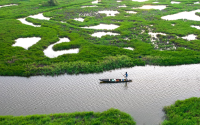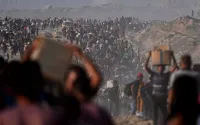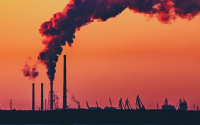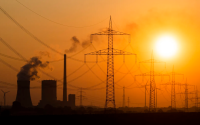7 July 2007
What is the one thing, the most urgent thing, that everyone can do to tackle global warming? Philip Mercer, London SW19
Well, first of all, learn about it. Learn about the ways in which you can become part of the solution to the problem in the contexts of your own life. Learning about it is important in your role as a citizen, and in helping to achieve the policy changes that in the long term will be required to solve this crisis.
Where individual actions are concerned, cut down on energy use. Become conscious as a consumer of picking the most environmentally friendly alternatives - and they are always there. You can make symbolic actions like changing lightbulbs to bulbs that use a tiny fraction of the energy, but remember that less visible changes that can accomplish the same thing are available for every product.
What do you think staging the Live Earth concerts will achieve? Don't you think there's a danger people will just enjoy the music and then forget about the issues? Ben Patterson, Liverpool
I'm relatively certain they'll enjoy the music, because the best acts in the world are playing. And I'm hopeful that Live Earth will serve as a unique opportunity to ask the entire world to hear the SOS for climate in crisis. Once we have their attention, we intend to launch a three-year campaign to put the solutions before every person in the world. I'm very optimistic that we'll have a chance to have a measurable difference.
What is your response to Bob Geldof's criticism of Live Earth that this is just another giant pop concert, and that the premise behind it is ludicrous? Keith Farrell, Chester,
I'm a big fan of Bob Geldof and respect him immensely, but he's simply wrong when he says that everyone is already completely aware of all the facts concerning the climate crisis. Indeed, just yesterday, the MORI poll in the UK showed that 56 per cent, more than half of the British people, think that there's no scientific consensus at all that human beings are causing global warming. And that more people feel that dog mess and litter are problems than the destruction of the habitability of the only planet human beings have.
It does sometimes seem, to those of us who have studied on it and worked on it, as [Bob Geldof] has, that everyone knows. The truth, sadly, is that we still have a lot of work to do to get the word out, and to raise awareness to the point where our civilisation will make the dramatic changes necessary.
We are asking every single person among the two billion in the audience to take a seven-point pledge. It's aimed at very specific outcomes. And it's aimed at not getting messages out on one day, but of using that one day as the launch pad for a three-year campaign. In the UK, our partners 'We're in this Together' www.together.com and 'I Count' www.icount.org.uk will continue campaigning on these issues.
Isn't it hypocritical to stage a series of concerts to raise environmental awareness in the full knowledge that the half the stars will fly in by private jet and the audiences will drive to the arenas? Michael Leigh, Cardiff
First of all Kevin Wall and his team have done an incredible job of setting a new green standard for these concerts. Many of the performers are playing in the arenas closest to them. Many have, as a result of this concert, created new patterns in their touring that sharply reduce CO2. Others have long set that standard on their own. At least one of the acts here at Wembley will be arriving by Tube. Many of the events include the price of mass transportation tickets in the price of the ticket. There are special arrangements made for cyclists who arrive at the concerts.
Of course, we are in a transition time in history when the only way we can get to where we need to be is by starting from where we are. If we simply spend our time criticising one another for where we are, that will further delay our departure for where we need to be.
In 1992 you advocated a new set of "rules of the road" for the conduct of the global economy, to take account of environmental costs and benefits. What progress do you think has been made since then? Bernard Payne, Chester
Not nearly enough. And actually, a re-examination of accounting systems and measurement protocols to include the environment in the routine, everyday calculations by which our economy is governed, comes about as close as you can get to the heart of why we have this crisis.
We treat the atmosphere of the earth as an open sewer. Since CO2 is odourless, invisible and tasteless, and has its pernicious effect only in the global dimension, it falls prey to the old saying "out of sight, out of mind". Yet, accounting systems are required to hold routinely in mind factors that are deemed to be important and significant in weighing the pros and cons of any decision. There has been progress to reform and redesign the accounting system. But not nearly enough.
Is carbon offsetting complete nonsense, something to quieten a nagging conscience while doing nothing to change people's behaviour? Jon Allgood
No, not at all. The debate has moved on to what kinds of carbon offsetting have credibility, and which fall into the "snake oil" category. Those that have genuine integrity are now, actually, driving a massive cottage industry around the world, which is every day reducing CO2 emissions with programmes such as the replacement of kerosene burners with solar cookers, the replacement of dirty coal with small-scale micro-hydro generators. The list is endless.
It is a cottage industry, but there is an impressive movement now to infuse it with standards and accountability to give those at the other end of the transaction, who are desiring to purchase offsets, the confidence that they are entitled to feel that offsets are resulting in tangible changes in the world. As we do make this journey from where we are to where we need to be, the means by which we get there will include offsetting. So, while I understand the philosophical criticisms of offsetting - and, all too often, those criticisms are valid - it would be wrong to throw out the baby with the bath water. Because when they do have integrity, and when there is accountability, they can provide a much-needed link between the wealthy countries and the poor countries, and enable us to conceive a set of truly global solutions to this crisis.
I care about both the environment and helping impoverished farmers in Africa. So should I buy mange toutes from Kenya? Joel Mendenhall, Edinburgh
I sympathise with you Joel. I, too, feel like I don't have enough information about who's growing them, who's transporting them, how they're grown, how many food miles are generated in transporting food from a continent away. I don't think there's a simple answer to this.
I am sympathetic to the Slow Food movement, which emphasises supporting local farmers within half a day's drive of the place where one lives, and to minimise the amount of transportation that goes into moving the food from the farm to the table.
But I'm torn. Because I do believe that when responsibly implemented, these trading arrangements, that give these poor farmers in Africa an opportunity to find markets in other countries, can also have a role. Over time, I hope and expect a much greater shift towards local sourcing of food. And I must say the growing concerns over adulterated products from places such as China may feed this trend.
What right do we have to tell countries such as China, with rapidly developing economies, that they need to curb their emissions? Tim Wootton, Newcastle
Many years ago in my country, Martin Luther King Jnr said "injustice anywhere is a threat to justice everywhere". In the same way, we can now see that increased CO2 emissions anywhere are a threat to worsen the climate crisis everywhere. And the consequences for China itself of continuing a pattern that contributes the worsening of the climate crisis are now being more readily understood within China.
It is, of course, a legitimate point about injustice. The Western world has gone through the development phase of their history. It is unjust that China has to stay at a much lower level of development to save the planet, while we continue what we're doing.
The answer, instead, is for the Western countries to take the lead in the new technologies that make improvements in the standard of living while simultaneously sharply reducing CO2 emissions. This holds out the possibility for nations such as China to leapfrog the old "dirty phase" of the industrial age.
You're a former newspaper reporter and visiting professor in journalism at Columbia University. So how do you view today's news media? Are standards of reporting higher or lower than you remember them? And how do you regard coverage of environmental issues? Susan Thomas, York
I honestly believe that this generation of reporters and editors is the best prepared, and the most committed, of any generation of journalists in history. But I think they face unusual difficulties with the consolidation of ownership, the blending of news and entertainment values, and with the constant pressures to integrate the honourable profession of journalism into a mandate by conglomerate owners to meet the bottom line. This has resulted, in all too many publications, with the firing of editors and reporters, the shrinking of the space allocated for news, and increasing pressure from advertisers and commercial interests that distort the priorities that the owners and editors would otherwise establish.
Do you believe you won the 2000 presidential election? And if so, how do you feel about being denied the top job? Simon Hooper, London NW6
Of course, the popular vote was in my favour, and the outcome in the electoral college was not driven by an effort to count every vote that was cast, because the counting was truncated by a Supreme Court decision. In the American system, unfortunately there is no intermediate step between a Supreme Court decision and violent revolution.
Given those two remaining alternatives, I took the advice of Winston Churchill, who said that the American people generally do the right thing after first exhausting every available alternative. Choosing to live under the rule of law seemed to be the only alternative remaining, even though I strongly, strongly disagreed with the Supreme Court decision. Historians and scholars will put that decision in its own separate category.
Been to Florida recently? Nat Dale, Cambridge
Yes, I have. I love Florida, and I've never felt a reluctance to visit there after the election controversies. I felt that the majority of the people there made the right decision in 2000.
Do you ever consider how you would have reacted if it had been you, rather than George Bush, who was President on 11 September 2001? What would your response to the terrorist attack have been?
Jonathan Gough, Cirencester
I've been asked this a lot. I like to think I would have reacted as well as President Bush did in the immediate aftermath of the attack. By that, I mean I think he rallied the American people in a very effective way. And he made the right decision to invade Afghanistan to hunt down the person responsible for the attacks. But I think he took a fateful wrong turn soon thereafter. And, I felt it was a terrible mistake to withdraw most of our troops from Afghanistan just as they had Osama bin Laden surrounded, and divert them to invade a country that had nothing to do with the attack and launch a horribly misguided war that has alienated America's natural allies around the world, has created the worst strategic mistake in the history of the USA, and to this day, has 150,000 troops trapped in the middle of a civil war from which there are no easy exits. It will go down in history as the single most damaging blunder by any president in the history of the country.
Please don't be a politician in your answer to this, and answer yes or no: are you going to stand for president? Perry Spellar, Bournemouth
I don't plan to. The reason that I haven't ruled out the possibility for all time is simply that I feel it's the right thing for me to do right now to focus on a different kind of campaign - to try to change minds on the urgency of climate change. If I manage to change enough minds, then whoever is president will face demands from the people to solve the climate crisis.
You shared a room at Harvard with the actor Tommy Lee Jones. Of the two of you, who got the girls? Mike Barber, Bristol
We both tried to, with variable levels of success. At one point, we became part of a travelling minstrel band to visit girls' colleges in the Boston area, and perform country music numbers ... terribly. We didn't have notable success, but I was lucky to meet Tipper, who later became my wife. Tommy and I were at each other's weddings and remain close friends.
The seven-point pledge
On Thursday in New York Al Gore and Kevin Wall, the producer of the concerts, signed Live Earth's seven-point pledge on the climate crisis:
* To demand that my country joins an international treaty within the next two years that cuts global warming pollution by 90 per cent in developed countries and by more than half worldwide in time for the next generation to inherit a healthy earth.
* To take personal action to help solve the climate crisis by reducing my own CO2 pollution as much as I can and offsetting the rest to become "carbon neutral".
* To fight for a moratorium on the construction of any new generating facility that burns coal without the capacity to safely trap and store the CO2.
* To work for a dramatic increase in the energy efficiency of my home, workplace, school, place of worship and means of transportation.
* To fight for laws and policies that expand the use of renewable energy sources and reduce dependence on oil and coal.
* To plant new trees and to join with others in preserving and protecting forests.
* To buy from businesses and support leaders who share my commitment to solving the climate crisis and building a sustainable, just, and prosperous world for the 21st century.
Gore 'falls out of love' with politics
Al Gore has again dashed the hopes of liberals that he will run for president next year saying he has "fallen out of love with politics". Asked on NBC's Today Show why he wouldn't run for president again - when he could lead the fight against global warming - Mr Gore said those in power needed the support of the people to make it work.
"The key players are the American people," he said. "When the American people have the awareness of what this means for their children and grandchildren, that all of civilisation is at risk here, then they will demand that whoever is running for office, whoever is elected to serve, will have to respond."
He has not completely shut the door and has yet to endorse any of the existing candidates. "I'm involved in a different kind of campaign, not for myself, not as a candidate, but to change people's minds about the most dangerous crisis we've ever faced,'' he said.
"I've kind of fallen out of love with politics ... Whatever experience and talents I've gained over the years, I think it may be the highest and best use of that, is to try to bring enough awareness of the solutions to the climate crisis."
http://environment.independent.co.uk/climate_change/article2742779.ece






